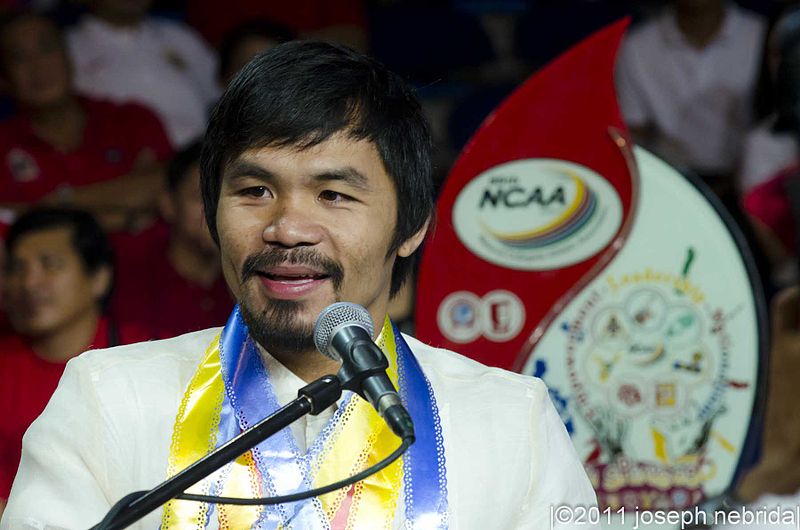
March 21, 2016, by Editor
Manny Pacquiao is the Anita Bryant of the Philippines
Written by John Andrew Evangelista.
Fired for her religious convictions, Anita Jane Bryant, famous U.S. endorser and singer, led the “Save Our Children” campaign in the late 1970s. The campaign wanted to repeal laws meant to protect LGBT rights in different American states. Backed up by different religious groups and several conservative politicians, Bryant’s campaign had some success in states like Florida. Her activism had some backlash. Bryant’s endorsement of Florida Orange Juice was reportedly cancelled because LGBT organizations started boycotting the brand.
Influential Celebrities
Manny Pacquiao’s opinion clearly parallels with Anita Bryant’s. Both opinions were coming from someone with a celebrity status. Pacquiao became famous as a boxer who eventually went into show business. Aside from being a celebrity, Pacquiao has another layer of influence. For two consecutive elections (2010 and 2013), he landed a seat in the Philippine Congress. This election, he hopes to land a seat in the Philippine Senate.
Religious Dogma
Bryant’s and Pacquiao’s claims hide behind biblical passages. They both speak in circles. It conceives homosexuality as bad because the bible says so. They claim that the Bible condemns homosexuality because it is bad. The validity of this circular argument is hard to confirm. Not like religious assertions, other claims work within the confines of evidence. Stories of abused housewives prove the importance of condemning domestic violence. Suicide notes from bullied gay kids support LGBT activists’ claim to pass the Anti-Discrimination Bill.
We have different ways of reading the Bible. We also have diverse interpretations of worldly experiences and how they stand as proofs of biblical claims. Sometimes, these different appreciations conflict with each other because they work within different assumptions. LGBT pastors conceive the Bible as a text in need of constant interpretation depending on our present context. Some conservative pastors and priests perceive the Bible as a set of laws with perpetual meaning leaving no room for interpretation.
Different understandings of the Bible set different criteria of judging which interpretations are correct. These differences make it hard to outline rules of a proper legislative debate to resolve the issue. For this reason, we ought not to base public policies on religious faith.
Claiming Love
Pacquiao and Bryant both claim that they come from the place of love. Bryant was often quoted in interviews saying, “I love homosexuals. I love homosexuals enough to tell them the truth about the Bible”. Pacquiao is the same way. He claims that he loves homosexuals by citing how many LGBT individuals he was able to send to school.
Love should not be the foundation of legislation. Like faith, we have different ways of approaching love. Some of our ideas of love conflict with each other. Some believe in consensual polygamy. Some cherish monogamy. Some believe in tough love. Some value gentle love. Some understand love as sexual. Yet, some see it as platonic.
These differences make it hard to resolve what form of love is the ideal foundation of state action. The legitimizing effect of laws has the tendency to favor one form of love over others. To legitimize some forms of love through legislation is dangerous because it implies that social relationships based on other forms of love are less important.
For example, states afford parents the right and responsibility of disciplining their children to avoid favoring one form of parental love. The state allows parents to nourish their children in various forms as long as their parental practices do not violate their children’s rights.
Rights-Based is the Right way
LGBT issues ought to be discussed using the human rights frame because we are all human beings, NOT animals.
Human rights are entitlements that we should enjoy because we are human beings. They have the potentiality to equalize people because everybody is entitled to these privileges. Rights provide potential resolution to our obvious differences. The human rights frame allows anyone to believe in her respective God or to love in the way she deems right. This approach makes rights accessible to citizens without qualifying who is ‘majority’ and who is ‘minority’.
The Anti-discrimination Bill, marriage equality advocacy, gender recognition initiatives and other LGBT causes speak the language of human rights. They seek to protect LGBT rights without taking away the right of the ‘majority’ to access their rights.
The human rights strategy will not put anyone in a grossly disadvantaged position. It seeks to provide citizens equal access to resources necessary to lead a dignified life regardless of religious faith, sexual orientation, gender identity, and expression. I think this is the essence of a democratic state which we strongly claim to be what the Philippines is.
John Andrew G. Evangelista teaches at the University of the Philippines-Dilima. This article was first published on the University of the Philippines Halalan 2016 blog and can be found here. Image credit: CC by inboundpass/Flickr.
No comments yet, fill out a comment to be the first

Leave a Reply